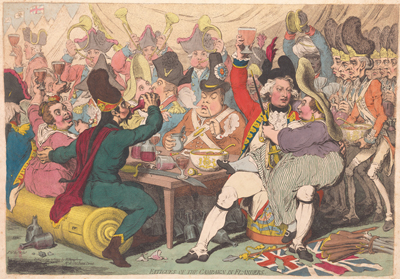Fatigues of the Campaign in Flanders
This print shows the 29 year old Duke of York, who had recently been named to head the British forces in Flanders, celebrating rather too soon and too vigorously after a much-touted "very COMPLETE VICTORY" over the French near Vicogne and St. Amand on May 8–10 which, as the Evening Mail for May 13 put it, "ended in their TOTAL DEFEAT. He is joined by the narcoleptic hereditary Prince of Orange, absorbed in his pipe, and a Prussian officer guzzling port. See Gilray's The Introduction for a similar Prussian guard.

© Beinecke Rare Book & Manuscript Library, Yale University
When the new French republic declared war on England and the Netherlands on February 1st, 1793, Pitt expected that, given her internal problems, any war with France was likely to be short. His response was consequently to work mainly through proxies, creating a coalition force with Holland, Austria, Prussia, Spain, and Sardinia to fight the French. The English army had been basically neglected after its defeat in the American war for independence, so only a token force of approximately 1500 men was raised for this occasion under the direction of the King's favorite son, Frederick, the Duke of York. Not surprisingly, contemporary newspaper accounts initially exaggerated the role and contribution of the British forces. After recounting how the British soldiers came to the aid of the Prussians under General Knobeldorf, the Evening Mail, for instance, goes on to remark that
we have the pleasure to say, that it was owing to the bravery of our troops that the event of the battle was so successful.
With much of the feel of a Dutch tavern scene, Gillray presents a contrary and highly critical view of the young Duke and the combined armies which anticipates the later recognition of their colossal mismanagement of this stage of the war.
First of all, we see the complete perversion of the military and its equipment. The regular soldiers have been turned into waiters and musicians for the pleasure of the coalition leadership. A cannon and drum have become a seat and bench at a drinking table. A sword is a table extension that doubles as a knife for cutting lemons. The muskets which ought to be wielded by the soldiers are still bundled unused as they were when they arrived. The British flag lies torn, neglected, and trod upon by very person who should be defending it.
Then there is contrast between the well-fed and dissipated officers with their overly plump prostitutes and the poor emaciated common soldiers serving them. The Duke, in particular, is portrayed as a florid Tom Rakewell, with jacket open, hat askew, ready to pledge another toast, while the prostitute in his lap has a firm grip upon his equipment.
Sources and Reading
- Commentary from the British Museum on Fatigues of the Campaign in Flanders.
- "Prince Frederick, Duke of York and Albany," Wikipedia
- "William V, Prince of Orange," Wikipedia
- "War of the First Coalition," Wikipedia
- Robert Harvey, The War of Wars, 2006, Chapters 16 and 17.
- Thomas Wright and R.H. Evans, Historical and Descriptive Account of the Caricatures of James Gillray #100
- Thomas Wright and Joseph Grego, The Works of James Gillray, the Caricaturist; With the History of His Life and Times, pp. 169-70.
Comments & Corrections
NOTE: Comments and/or corrections are always appreciated. To make that easier, I have included a form below that you can use. I promise never to share any of the info provided without your express permission.